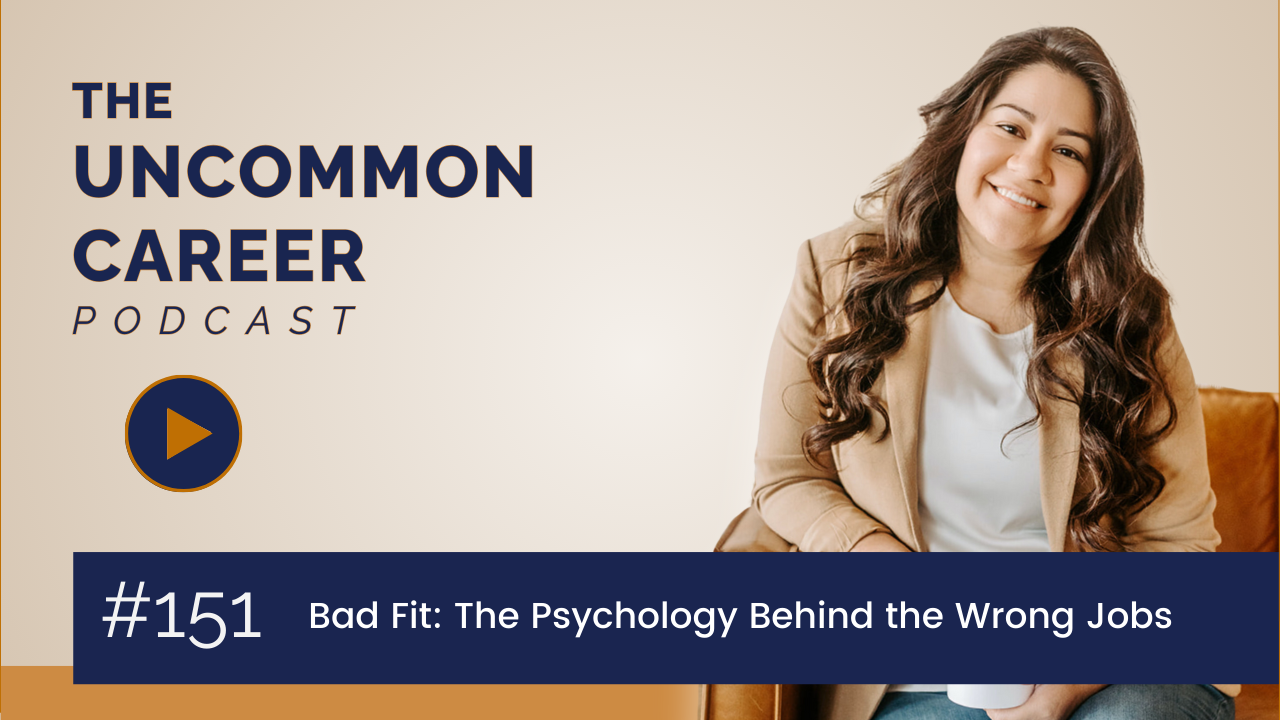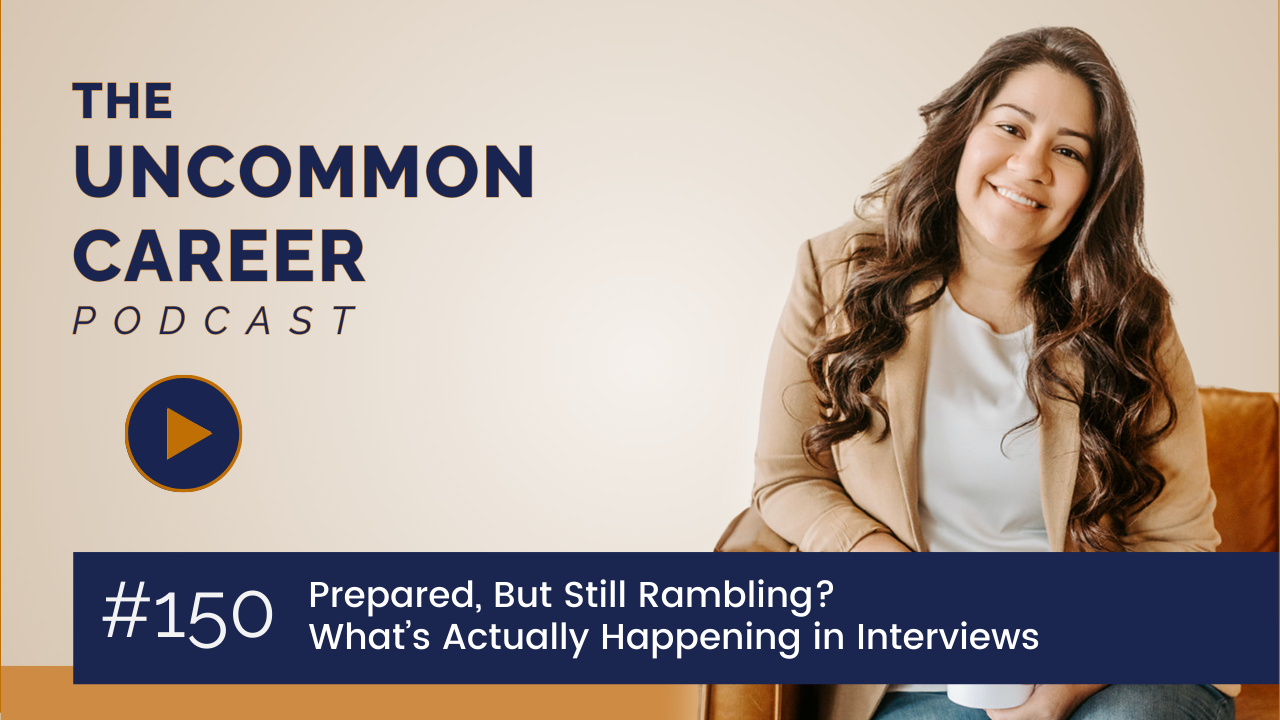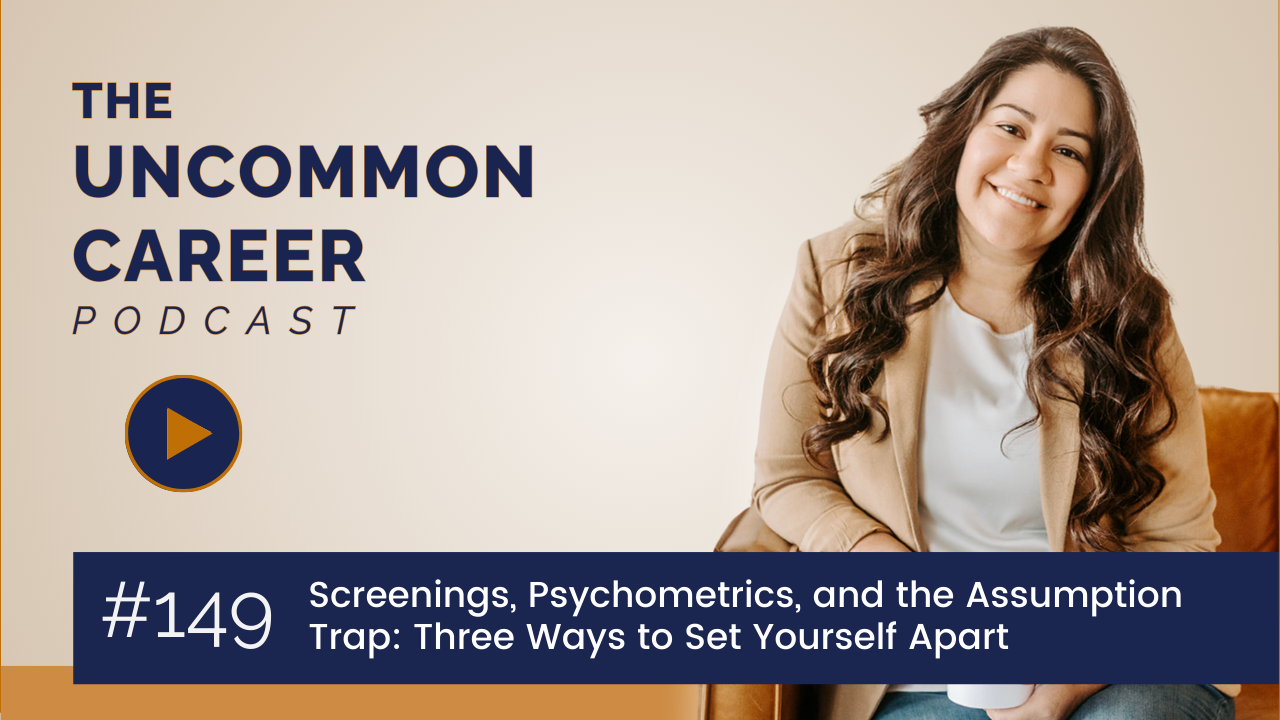125. Hired but Unhappy - What Happened and What to do Now
Aug 19, 2025
This episode is part of the Elevated Leadership Podcast Series, co-hosted with Julianna Yau Yorgan. It is available here on The Uncommon Career Podcast and The Daring to Succeed Podcast.
When You’re Hired… But Unhappy: What Now?
You finally landed the job you worked so hard for. The position looked like a perfect fit.
The onboarding was smooth, the team welcoming, and the leadership seemed solid.
But somewhere between those first few weeks and now, something shifted. The satisfaction you expected didn’t last. Motivation is low, enthusiasm is fading, and the dreaded question arises: “Did I make a mistake?” This isn’t a rare experience, and it doesn’t mean failure.
In this segment with Julianna Yau Yorgan, let's unpack how to recognize what’s really going on, what caused the shift—and what the best next move should be.
|
Listen on your favorite podcast app: |
| |
Start at the Start: Revisit the Job Search
Before jumping into another round of applications and networking, take a beat. It’s tempting to make a quick exit when things feel off—but it’s much more powerful to pause and ask some reflective questions.
What was the original intent behind pursuing this role? Was this job a deliberate career step, or was it simply a quick escape from something worse?
Clarity comes when the experience is examined from the beginning—through the lens of strategy, not just emotion.
A smart review of the job search reveals whether this discomfort stems from a poor fit, or from unmet (or even unclear) expectations from the start.
- Was the job truly aligned with long-term goals—or was it a short-term solution?
- Were any red flags ignored or rationalized during the hiring process?
- Were values clearly defined before accepting the offer—or was the decision based mostly on urgency?
What Shifted: Find the Trigger or Anchor
Something changed—and pinpointing that shift is crucial.
Was it the work environment, a reorganization, a manager transition, or a breakdown in communication? It’s easy to sense that something feels “off,” but without identifying the specific trigger or anchor, the dissatisfaction stays vague and unresolved. Getting clear here allows for an informed decision on whether to recalibrate or walk away.
Finding the hinge point of the change sheds light on whether the problem is circumstantial, fixable, or a non-negotiable dealbreaker.
- Was there a specific moment or change that altered the job experience?
- Did something external shift—or did internal perception begin to change?
- Is the discomfort tied to a real, observable issue—or to a personal reaction that needs unpacking?
Expectations vs. Reality: Bridging the Gap
No job comes without imperfections, but that doesn't mean misalignment should be ignored.
The gap between what was expected and what is being experienced can widen fast if left unchecked. Some expectations may have been unspoken or even unconscious—but when they go unmet, frustration builds. This is where reflection matters most. Are the issues based on genuine mismatches, or are they stemming from outdated assumptions?
Recognizing this distinction could be the difference between leaving too soon or staying for the right reasons.
- What was imagined about this role before stepping into it—and what’s been true?
- Are the issues temporary, tied to the transition phase, or persistent?
- Could a small shift in mindset or work style help bring expectation and reality closer together?
Coaching Yourself: Gaining Clarity Without the Storm
Self-coaching is a skill worth developing—especially in moments like these. When the instinct says “run,” the wiser step might be “reassess.”
Imagine sitting down with a future version of yourself—one who’s gained insight and wisdom over time. What advice would be offered from that perspective? Creating emotional distance from the situation, even just briefly, helps shift from reactive to strategic.
This is the space where real insight forms. It’s where surface-level frustrations are peeled back and the deeper themes start to reveal themselves.
- Ask: “If this were a friend in my shoes, what would I suggest they do?”
- Use time-distance visualization: What would this situation look like ten years from now?
- Identify whether current thoughts are helping progress—or reinforcing discouragement.
When (and How) to Reframe the Resume
If a decision has already been made to leave—or even entertain the idea—there’s often hesitation around how to frame a short-term stint.
Does it go on the resume? Will it hurt future chances? The key is to detach emotion from the document. A job that didn’t work out doesn’t have to be a red flag. It can be a bridge, a pivot, or a short chapter that brought valuable clarity.
The resume doesn’t need to carry the emotional weight of the experience. It needs to show progress and value. That’s it.
- Focus on what was gained—even in a short timeframe.
- Tell the story strategically: “This role helped clarify next steps.”
- Treat it as part of the evolution, not a failure to hide.
Stay or Go? Making the Call
This is the core question, and it deserves thoughtful examination. Is the discomfort circumstantial—or is the environment truly misaligned with core needs?
The temptation to jump ship is real, but so is the potential for transformation. Knowing the difference means understanding what’s driving the unrest. If the root issue is rooted in growth discomfort—not actual harm—there may still be something valuable in staying.
There’s strength in making an intentional decision, rather than reacting out of frustration or fear.
- Is this job genuinely harmful or toxic—or is it simply uncomfortable?
- Is this discomfort a sign of growth, of expectations not being met, or a bit of both?
- What would happen if this challenge were used as a tool to develop a new skill?
When It’s About People, Not Tasks
Often, the dissatisfaction isn’t about duties or responsibilities—it’s about the people.
A boss who communicates differently. A coworker whose personality clashes with your own. These situations are frustrating, yes—but they can also be opportunities to develop interpersonal fluency. Adapting doesn’t mean surrendering values. It means strengthening a skill set that holds value across industries and roles.
Learning how to navigate difficult personalities or work styles could be the edge that sets a candidate apart in the future.
- Instead of “why should I change?” consider “what would change if I adapted slightly?”
- Could this be a moment to learn an EQ skill that pays off down the road?
- How can flexibility lead to freedom in this—and future—work environments?
Reflect, Rethink, Reframe
Sometimes, what feels like the end is really a turning point.
And sometimes, the biggest breakthroughs come right after the moment of doubt. Before rushing out the door, take time to assess. If it’s truly not the place to stay—leave with clarity. But if the root of the dissatisfaction is misaligned perception or unmet expectations, that awareness is golden.
There is no shame in stepping away—and there is great strength in choosing to stay with intention.
- Reflect on whether the job misalignment is internal or external.
- Rethink the situation by zooming out and identifying the real pain point.
- Reframe the experience as part of the journey—not the end of the story.
Even if it feels like you’re in a cage, if you built it, you can dismantle it.
And maybe—just maybe—the door’s been open all along.
Growth begins the moment clarity replaces confusion—and that’s when career momentum truly starts.

P.S. Follow me on LinkedIn for more highly-practical guidance.












